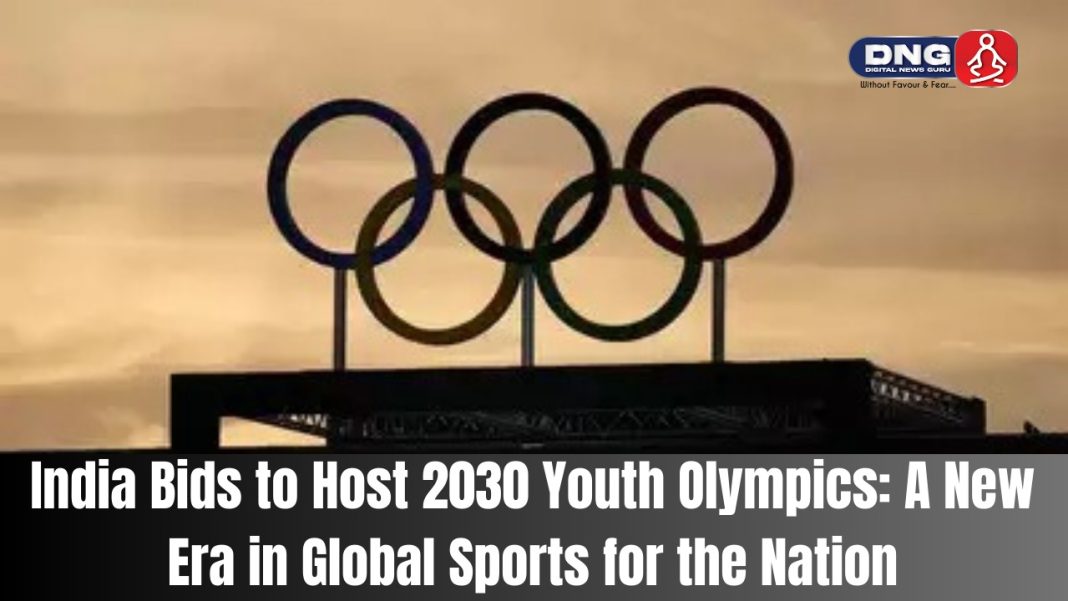DIGITAL NEWS GURU DELHI DESK:
India Bids to Host 2030 Youth Olympics: A New Era in Global Sports for the Nation
In a significant step toward establishing itself as a global sporting destination, India has officially submitted its bid to host the 2030 Youth Olympics.
This marks the first time the country has pursued hosting the prestigious multi-sport event, underscoring its growing ambition to leave an indelible mark on the international sports landscape. With a booming population, rich cultural heritage, and an increasingly modern sports infrastructure, India is positioning itself as a strong contender to host the Youth Olympic Games (YOG), which features some of the best young athletes from around the world.
The announcement of India’s bid has generated considerable excitement in sporting and political circles alike, as it represents more than just a desire to stage a world-class event—it reflects the nation’s broader aspirations to boost its sports ecosystem and global stature. The Youth Olympics could provide a valuable platform to further cultivate sports development across the country while showcasing its ability to organize large-scale international events.
India’s Growing Sports Aspirations

India has been making significant strides in the world of sports, both on the field and in terms of infrastructure. While the country has traditionally been known for its cricketing prowess, recent years have seen a broader diversification in its sporting achievements. India’s performance in events like the Olympics, Commonwealth Games, and Asian Games has steadily improved, with athletes excelling in various disciplines such as badminton, boxing, wrestling, and hockey. In fact, the Tokyo 2020 Olympics saw India achieve its best-ever medal tally, which included a historic gold in men’s javelin throw by Neeraj Chopra.
The government’s push for sports through initiatives like Khelo India, Target Olympic Podium Scheme (TOPS), and increased investment in grassroots development is beginning to yield results. Hosting the Youth Olympics would further solidify this progress and inspire future generations of athletes to pursue excellence in diverse sports.
Why the Youth Olympics?

The Youth Olympic Games, held every four years, are a relatively new concept in the sporting world, with the inaugural event taking place in 2010 in Singapore. They are designed to bring together the world’s best athletes aged 14 to 18 for an event that not only focuses on competition but also promotes the Olympic values of friendship, respect, and excellence. The event provides an excellent platform for young athletes to gain international exposure, offering a glimpse of potential future Olympians.
For India, hosting the 2030 edition of the Youth Olympics would be a historic opportunity. It would allow the country to showcase its burgeoning sports infrastructure, including world-class facilities and stadiums across multiple cities. Moreover, it would give India a chance to highlight its cultural richness to a global audience, as the event is known for incorporating cultural and educational elements alongside the sports competition.
The Youth Olympics are smaller in scale compared to the traditional Olympic Games, with fewer athletes and events, making them more manageable for host nations. For India, this could be an ideal stepping stone toward hosting larger events like the Summer or Winter Olympics in the future. In fact, there has already been talk of India bidding for the 2036 Summer Olympics, making the 2030 Youth Olympics a potential precursor to that ambition.
A Competitive Bidding Process

India’s bid for the 2030 Youth Olympics will not be without competition. While the official list of bidders is yet to be finalized, several other countries have expressed interest in hosting the event. These may include sporting powerhouses such as Spain, Russia, and South Korea, all of which have strong track records in hosting international sporting events.
Despite the potential competition, India is poised to present a compelling case. Its experience in successfully organizing the 2010 Commonwealth Games in New Delhi and the FIFA U-17 World Cup in 2017 demonstrates the country’s capability to handle large-scale international events. Furthermore, India has been enhancing its sports infrastructure, with state-of-the-art facilities being developed in cities like Delhi, Mumbai, Bangalore, Ahmedabad, and Chennai.
The Indian government has also emphasized its commitment to supporting the bid. The Prime Minister, along with several high-profile ministers and officials, has expressed strong backing for the effort, viewing it as an integral part of India’s long-term sports strategy. The Indian Olympic Association (IOA), which is leading the bid, is working closely with the government and private sector stakeholders to present a robust proposal to the International Olympic Committee (IOC).
Challenges Ahead

While India’s bid is ambitious and promising, it also faces some significant challenges. The country will need to address several key issues, including infrastructure development, logistical planning, and financial considerations. The 2010 Commonwealth Games, though ultimately successful, were marred by controversies related to delays, cost overruns, and allegations of corruption. India will need to ensure that it avoids a repeat of such issues to maintain its credibility on the global stage.
Another important factor will be India’s ability to create a comprehensive plan that aligns with the IOC’s emphasis on sustainability and legacy. The IOC has been placing increased importance on the long-term impact of hosting the Olympics, ensuring that facilities and infrastructure are utilized effectively after the event and that the Games leave a positive social and environmental legacy. India will need to demonstrate how it plans to meet these criteria in its bid.
The Potential Impact
Should India succeed in its bid to host the 2030 Youth Olympics, the impact on the country’s sporting ecosystem would be profound. Hosting such a prestigious event could significantly boost the development of sports at the grassroots level, encouraging greater participation among the youth and identifying new talent across different sports. Furthermore, the event would bring with it a surge in tourism and international exposure, benefiting India’s economy and global image.
For Indian athletes, having a major international event on home soil would be an invaluable experience, providing them with the opportunity to compete against the world’s best in front of their home crowd. This could lead to a surge in enthusiasm for sports, as was seen in Japan following the Tokyo 2020 Olympics and in Brazil after the Rio 2016 Games.
YOU MAY ALSO READ: Rashtriya Poshan Maah 2024: A Nation’s Drive Toward Nutrition Security








